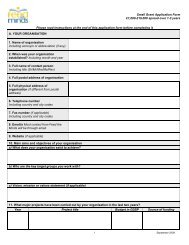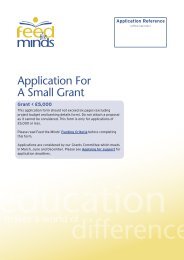Female Genital Mutilation practices in Kenya: - Feed the Minds
Female Genital Mutilation practices in Kenya: - Feed the Minds
Female Genital Mutilation practices in Kenya: - Feed the Minds
Create successful ePaper yourself
Turn your PDF publications into a flip-book with our unique Google optimized e-Paper software.
28.<br />
FActors thAt mAy hAve<br />
contributed to chAnGe <strong>in</strong><br />
<strong>the</strong> PrActice<br />
FGD and <strong>in</strong>terview participants identified <strong>the</strong><br />
follow<strong>in</strong>g factors that have contributed to change<br />
or resistance to change <strong>in</strong> <strong>the</strong> community with<br />
reference to FGM.<br />
Religious <strong>in</strong>fluence: A key factor that is<br />
attributed to <strong>the</strong> abandonment of <strong>the</strong> practice<br />
was <strong>the</strong> stand taken by <strong>the</strong> churches, which have<br />
rejected female circumcision, result<strong>in</strong>g <strong>in</strong> some<br />
members abandon<strong>in</strong>g <strong>the</strong> practice. The Bible is<br />
quoted as support<strong>in</strong>g male circumcision but not<br />
female circumcision.<br />
Education: Ano<strong>the</strong>r factor repeatedly mentioned<br />
is education, and exposure to new <strong>in</strong>formation on<br />
<strong>the</strong> health risks and illegal status of FGM. This has<br />
been most noticeable <strong>in</strong> urban areas and has led<br />
some Kisiis to change <strong>the</strong>ir stand on FGM.<br />
The majority of programmes on <strong>the</strong> abandonment<br />
of FGM have worked through schools as a means<br />
of access<strong>in</strong>g young girls, provid<strong>in</strong>g <strong>in</strong>formation<br />
on <strong>the</strong> health risks and illegality of FGM and<br />
empower<strong>in</strong>g girls to say no to be<strong>in</strong>g circumcised.<br />
YWCA works <strong>in</strong> close collaboration with local<br />
schools, us<strong>in</strong>g <strong>the</strong>ir facilities and with teachers<br />
be<strong>in</strong>g facilitators at <strong>the</strong> ARP camps. Elsewhere,<br />
teachers talked of pupils ask<strong>in</strong>g for advice about<br />
FGM and a number of schools are runn<strong>in</strong>g after<br />
school clubs on FGM.<br />
Exposure to o<strong>the</strong>r cultures: Participants<br />
po<strong>in</strong>ted out that some members of <strong>the</strong> Kisii<br />
community who have married wives or husbands<br />
from o<strong>the</strong>r communities have managed to resist <strong>the</strong><br />
social pressure and not circumcise <strong>the</strong>ir daughters.<br />
Involvement of local authority, police<br />
and a wide range of stakeholders:<br />
Participants felt that activities to encourage <strong>the</strong><br />
abandonment of FGM need to <strong>in</strong>volve people from<br />
throughout <strong>the</strong> community. They blamed <strong>the</strong> poor<br />
coverage of <strong>the</strong> area by NGOs for <strong>the</strong> cont<strong>in</strong>ued<br />
resistance to change. They po<strong>in</strong>ted out that it is<br />
difficult to stop <strong>the</strong> practice if only <strong>the</strong> girls and<br />
mo<strong>the</strong>rs are targeted, as is often <strong>the</strong> case, leav<strong>in</strong>g<br />
out men and grandmo<strong>the</strong>rs who also contribute<br />
to <strong>the</strong> perpetuation of <strong>the</strong> practice. There is a<br />
demand for more widespread sensitization, with<br />
many participants feel<strong>in</strong>g that <strong>the</strong> community is not<br />
adequately <strong>in</strong>formed about <strong>the</strong> negative effects<br />
of FGM.<br />
AlternAtive rite oF PAssAGe<br />
(ArP) <strong>in</strong> kisii<br />
In Kisii this study focused on <strong>the</strong> ARP events<br />
organised by <strong>the</strong> YWCA <strong>in</strong> two adm<strong>in</strong>istrative<br />
districts: Igonga and Gucha districts. ADRA also<br />
runs a Girls Empowerment Programme (GEP),<br />
which has much <strong>in</strong> common with <strong>the</strong> YWCA<br />
programme. In 2009 YWCA and ADRA shared a<br />
graduation ceremony; however, <strong>the</strong>re are no plans<br />
to repeat this as both organisations would prefer<br />
<strong>the</strong>ir graduation ceremonies to be <strong>in</strong> <strong>the</strong> specific<br />
communities <strong>in</strong> which <strong>the</strong> events take place.<br />
YWCA is tak<strong>in</strong>g a ‘whole community’ approach<br />
work<strong>in</strong>g with girls and young women, parents and<br />
guardians, boys, op<strong>in</strong>ion leaders, government<br />
officials, school authorities, church leaders,<br />
circumcisers and <strong>the</strong> local adm<strong>in</strong>istration.<br />
The <strong>in</strong>volvement of local adm<strong>in</strong>istrators and<br />
government officers, such as <strong>the</strong> District<br />
Commissioner, District Officer, and Chiefs,<br />
ensured <strong>the</strong>ir support and endorsement of<br />
<strong>the</strong> activity.<br />
The YWCA programme began <strong>in</strong> 2006 and ARP<br />
was <strong>in</strong>troduced <strong>in</strong>to <strong>the</strong> programme <strong>in</strong> 2008. ARP<br />
programmes, up to one week long, are offered<br />
three times a year <strong>in</strong> April, August and December,<br />
although FGM takes place primarily <strong>in</strong> August<br />
and December. Facilitators are drawn from across<br />
<strong>the</strong> community and <strong>in</strong>clude teachers, reformed<br />
circumcisers, local official and YWCA tra<strong>in</strong>ers.<br />
The girls attend<strong>in</strong>g <strong>the</strong> ARPs are recruited through<br />
<strong>the</strong> schools, churches, Prov<strong>in</strong>cial Adm<strong>in</strong>istration,<br />
YWCA members, Maendeleo Ya Wanawake and<br />
o<strong>the</strong>r local partners. The girls recruited are aged<br />
between 6-12yrs. At <strong>the</strong> end of <strong>the</strong> tra<strong>in</strong><strong>in</strong>g <strong>the</strong><br />
<strong>in</strong>itiates of ARP are given certificates and parents<br />
are <strong>in</strong>vited to attend. Both <strong>in</strong>itiates and parents are




